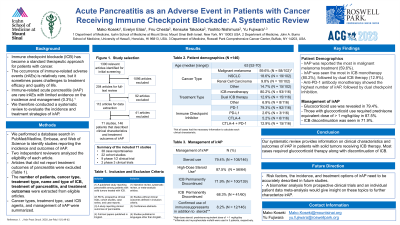Sunday Poster Session
Category: Biliary/Pancreas
P0029 - Acute Pancreatitis as an Adverse Event in Patients With Cancer Receiving Immune Checkpoint Blockade: A Systematic Review
Sunday, October 22, 2023
3:30 PM - 7:00 PM PT
Location: Exhibit Hall

Has Audio

Mako Koseki, MD
Icahn School of Medicine at Mount Sinai, Mount Sinai Beth Israel
New York, NY
Presenting Author(s)
Mako Koseki, MD1, Evelyn Elias, MD1, Fnu Chesta, MD2, Kensuke Takaoka, MD2, Yoshito Nishimura, MD2, Yu Fujiwara, MD1
1Icahn School of Medicine at Mount Sinai, Mount Sinai Beth Israel, New York, NY; 2John A. Burns School of Medicine, University of Hawaii, Honolulu, HI
Introduction: Immune checkpoint blockade (ICB) has become a standard therapeutic approach for patients with cancer. However, the occurrence of immune-related adverse events (irAEs) poses challenges to treatment efficacy and quality of life. Immune-related acute pancreatic (irAP) are rare irAEs with limited evidence on the incidence and management. We therefore conducted a systematic review to evaluate the incidence and treatment strategies of irAP.
Methods: We performed a database search in PubMed/Medline, Embase, and Web of Science to identify studies reporting the incidence and outcomes of irAP. Two independent reviewers analyzed the eligibility of each article. Articles that did not report treatment outcomes of pancreatitis were excluded. The number of patients, cancer type, treatment type, name and type of ICB, treatment of pancreatitis, and treatment outcomes were extracted from eligible articles.
Results: A systematic review identified 71 studies (38 case reports/series, 22 cohort studies, 9 phase 1/2 clinical trials, 2 phase 3 clinical trials) providing clinical characteristics and treatment outcomes for irAP in 145 patients. The median age [interquartile range] of patients from the case report/series alone was 63 [52-70]. The most commonly reported cancer types associated with acute pancreatitis were malignant melanoma (59.6% [n=58/102]), non-small cell lung cancer (18.6% [19/102]), and renal cell carcinoma (9.8% [10/102]). ICB monotherapy (80.2% [n=93/116]) and dual ICB therapy (12.9% [15/116]) were frequently utilized. The distribution of ICB subtypes was as follows: PD-1 blockade: 79.3% [n=92/116], PD-L1 blockade: 2.6% [3/116], CTLA-4 blockade: 5.2% [6/116], and PD-1 plus CTLA-4 blockade: 12.9% [15/116]. Glucocorticoids were used in 79.4% [n=108/146], of which 87.5% [56/64] of cases with glucocorticoid dosage information being available required the prednisone-equivalent dose of 1mg/kg/day or higher. ICB discontinuation was confirmed in 71.9% [n=100/139] and 68.3% [n=41/60] of cases permanently discontinued ICB use. Immunosuppressants, in addition to glucocorticoids, were used in 8.2% [n=12/146]; infliximab and mycophenolate mofetil (n=3, respectively) were commonly administered.
Discussion: Our systematic review provides information on clinical characteristics and outcomes of irAP in patients with solid tumors receiving ICB therapy. The majority of cases required glucocorticoid therapy along with discontinuation of ICB.
Disclosures:
Mako Koseki, MD1, Evelyn Elias, MD1, Fnu Chesta, MD2, Kensuke Takaoka, MD2, Yoshito Nishimura, MD2, Yu Fujiwara, MD1. P0029 - Acute Pancreatitis as an Adverse Event in Patients With Cancer Receiving Immune Checkpoint Blockade: A Systematic Review, ACG 2023 Annual Scientific Meeting Abstracts. Vancouver, BC, Canada: American College of Gastroenterology.
1Icahn School of Medicine at Mount Sinai, Mount Sinai Beth Israel, New York, NY; 2John A. Burns School of Medicine, University of Hawaii, Honolulu, HI
Introduction: Immune checkpoint blockade (ICB) has become a standard therapeutic approach for patients with cancer. However, the occurrence of immune-related adverse events (irAEs) poses challenges to treatment efficacy and quality of life. Immune-related acute pancreatic (irAP) are rare irAEs with limited evidence on the incidence and management. We therefore conducted a systematic review to evaluate the incidence and treatment strategies of irAP.
Methods: We performed a database search in PubMed/Medline, Embase, and Web of Science to identify studies reporting the incidence and outcomes of irAP. Two independent reviewers analyzed the eligibility of each article. Articles that did not report treatment outcomes of pancreatitis were excluded. The number of patients, cancer type, treatment type, name and type of ICB, treatment of pancreatitis, and treatment outcomes were extracted from eligible articles.
Results: A systematic review identified 71 studies (38 case reports/series, 22 cohort studies, 9 phase 1/2 clinical trials, 2 phase 3 clinical trials) providing clinical characteristics and treatment outcomes for irAP in 145 patients. The median age [interquartile range] of patients from the case report/series alone was 63 [52-70]. The most commonly reported cancer types associated with acute pancreatitis were malignant melanoma (59.6% [n=58/102]), non-small cell lung cancer (18.6% [19/102]), and renal cell carcinoma (9.8% [10/102]). ICB monotherapy (80.2% [n=93/116]) and dual ICB therapy (12.9% [15/116]) were frequently utilized. The distribution of ICB subtypes was as follows: PD-1 blockade: 79.3% [n=92/116], PD-L1 blockade: 2.6% [3/116], CTLA-4 blockade: 5.2% [6/116], and PD-1 plus CTLA-4 blockade: 12.9% [15/116]. Glucocorticoids were used in 79.4% [n=108/146], of which 87.5% [56/64] of cases with glucocorticoid dosage information being available required the prednisone-equivalent dose of 1mg/kg/day or higher. ICB discontinuation was confirmed in 71.9% [n=100/139] and 68.3% [n=41/60] of cases permanently discontinued ICB use. Immunosuppressants, in addition to glucocorticoids, were used in 8.2% [n=12/146]; infliximab and mycophenolate mofetil (n=3, respectively) were commonly administered.
Discussion: Our systematic review provides information on clinical characteristics and outcomes of irAP in patients with solid tumors receiving ICB therapy. The majority of cases required glucocorticoid therapy along with discontinuation of ICB.
Disclosures:
Mako Koseki indicated no relevant financial relationships.
Evelyn Elias indicated no relevant financial relationships.
Fnu Chesta indicated no relevant financial relationships.
Kensuke Takaoka indicated no relevant financial relationships.
Yoshito Nishimura indicated no relevant financial relationships.
Yu Fujiwara indicated no relevant financial relationships.
Mako Koseki, MD1, Evelyn Elias, MD1, Fnu Chesta, MD2, Kensuke Takaoka, MD2, Yoshito Nishimura, MD2, Yu Fujiwara, MD1. P0029 - Acute Pancreatitis as an Adverse Event in Patients With Cancer Receiving Immune Checkpoint Blockade: A Systematic Review, ACG 2023 Annual Scientific Meeting Abstracts. Vancouver, BC, Canada: American College of Gastroenterology.
